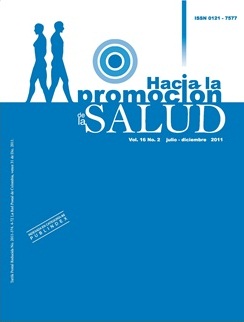Authors
Abstract
Objective: the purpose of this paper is to show how in violence situations, the body has a constant transition from being the object of violence to be incorporated in it.I In the Bourdian sense , to reflect it in the reconfiguration of social practices that would otherwise be culturally unacceptable. Materials and methods: it begins with a theoretical reconciliation of Maurice Merleau-Ponty, Marcel Mauss and Pierre Bourdieu’s conceptions of the corporeal in order to contrast ethnographic examples of the fieldwork carried out in the Colombian Municipalities of Marsella (Risaralda) and Trujillo (Valle). Results: some theoretical results emerged from this experience with people who had gone through violent events which permitted to characterize some post-conflict scenes in Colombia. Conclusions: in conclusion, it is important to reflect about the social and cultural ways to assume post-conflict practices and scenarios in Colombia, based on the premise that post-conflict does not mean “absence of”, but it is a phenomenon that becomes more complex through the reconfiguration of different forms of violence, in this case, violence facts on the body that are incorporated, and are made visible in the society practices.
References
Bauman Z. Holocausto y Modernidad. Madrid: Ediciones Sequitur; 1997.
El oficio de matar. [Informe especial] Rev Semana [serie en línea] 2007 Dic [citado 2010 Oct 10]. Disponible en URL: http://www.semana.com/noticias-especiales/oficio-matar/108229.aspx
Grupo de Memoria Histórica. La masacre de El Salado. Esa guerra no era nuestra. Bogotá D.C.: CNRR; 2009.
Mauss M. Sociología y Antropología. Madrid: Tecnos; 1979.
Bourdieu P. El sentido práctico. Buenos Aires: Siglo XXI; 2007.
Arendt H. Sobre la violencia. Madrid: Alianza; 2005.
Muguerza J. La no-violencia como utopía. En: Mardones JM, Reyes M, compiladores. La ética ante las víctimas. Barcelona: Anthropos; 2003. p.11-26.
Nates Cruz B. Cartografía semiótica y conflicto. En: Segovia J, Nates Cruz B, compiladoras Territorios, Identidades y Violencias. Colombia: Editorial Universidad de Caldas; 2001. p. 281-309.
Fisas V. La paz es posible. Una agenda para la paz del siglo XXI. Barcelona: Plaza & Janés; 2002.


 PDF (Español)
PDF (Español)
 FLIP
FLIP























